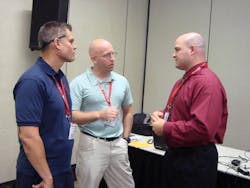FHExpo: Firefighters Need to Avoid 'Normalization of Deviance'
BALTIMORE, Md. – By their very nature, firefighters are deviants – but in a good way. So it’s almost natural there’s a “normalization of deviance” in the fire service.
Lt. John Dixon, a fire instructor with the Bergen County, N.J., Fire Academy and fire officer with the Teaneck, N.J., Fire Department presented a class on that very topic at Firehouse Expo in Baltimore on Friday. The title of his class was “Normalization of Deviance – How to Overcome Complacency.”
Dixon focused the discussion on how to avoid “the drift into failure” and how to avoid firefighter injuries and death by avoiding complacency.
Dixon opened his presentation with a series of images, including the Concordia shipwreck with the Italian luxury cruise ship lying on its side after running aground. He pointed out the captain of the wrecked vessel said he had sailed the waters three or four times previously and knew the waters well. He assumed nothing bad would happen, having done exactly the same maneuver previously.
“That’s drifting into failure through complacency,” Dixon said. “He had done it many times in the past, so he didn’t think anything was going to happen.”
Using another example, Dixon flashed an image of a step ladder on the screen with a warning label cautioning the user not to use the very top step.
“How many of you have used the top step,” Dixon questioned the attendees. Virtually every hand in the classroom went up. “How many have done it more than once,” he asked. Few less hands went up. He then asked why people ignored the caution sign and the obvious danger.
“It’s because nothing bad happened, so you assume that nothing bad would happen when you did it again,” he said. “That’s the normalization of deviance.”
It’s almost cliché, but because firefighters head to fires when others run away, that makes their behavior deviant from the norm already, Dixon said. So, it’s not too far to stretch that firefighters would deviate from standard operating guidelines and department rules, he said, especially when nothing bad happens, and there’s no one on the department to enforce the rules or reprimand deviant behavior.
Dixon said the normalization of deviant behavior is a slow process and happens without anyone even noticing it. In fact, the only time it’s noticed is when something bad happens and the deviant behavior is pointed out, like falling off the top of the ladder and someone pointing out that one shouldn’t have been using the ladder that way.
“You can even be normalized just by watching the deviant behavior,” Dixon said, adding that’s why it is important for officers and others in the department to follow correct procedures and protocols. Even watching videos of other departments not performing their duties properly can add to the normalization of deviant behavior.
“Just because you’ve been doing something for 20 years doesn’t mean you’re doing it right,” Dixon said.
Dixon said “the absence of a bad outcome” reinforces bad, or deviant behavior and foster a culture where “shortcuts are the new norm.” Luck is more of a factor than good training when nothing bad happens when deviant behavior and practices are exhibited, he said.
Deviance is not always a bad thing, especially when it is done with a purpose, to save a life for instance, Dixon said.
“It’s OK to deviate and take a risk when there’s a lot to gain,” Dixon said.
Dixon rejects the idea that there’s a general “woosification of the fire service.” He said training, procedures and SOGs are meant to protect and save firefighters. Firefighters can be aggressive while still following the rules.
And there’s no reason for firefighters to die just because they took short cuts or drifted into failure without realizing it.
Dixon said he doesn’t want to die in a fire just because rules weren’t followed. He said he has no intention to die in a fire risking his life to save another.
“People say: ‘It’s your job,’ Dixon said. “No it’s not. I did not sign up to die on the job. …I have always told my wife if I die on the job, it’s for a damn good reason.”
More from Firehouse Expo 2015:
- Picking The Right Fire Station Site Is Key
- Firefighters Hit the Streets for Lesson
- Creating Green and Red Zones in Fire Stations
- Basement Fire Tactics Explained
- Sendelbach Asks 'Are You All In?'
- Harvey Eisner Remembered, Keynote Stresses Accountability
- Chief to Chief Hands-on Program
- FDNY’s Muschello Honored with Top Heroism Award at Firehouse Expo
- Photos: Firehouse Expo - Day 3
- FDNY Captain Calls Fireground Communications Critical
- A Survival Guide for the Newly Promoted Company Officer
- Understanding Modern Fire Behavior Can Save Lives
- Fire-Rescue Competition Kicks Off
- Gender Neutral Fire Stations Are Possible
- Firefighters Get Lessons From Two Chiefs
- Fire-Rescue Competition Champs Hail From Fla.
- Surviving the First Year as a Company Officer
- Distinguished Contributors Inducted into New Firehouse Hall of Fame
- Salka Uses LODD Case study to Address Fireground Responsibility
- Reinhardt Offers Six Steps for Size-up
- Apparatus Buyers Hear Tips From the Experts
- Salka and Alkonis Square Off in Moderated Session
- 10 Exercises to Improve Firefighter Fitness
- Understanding Modern Fire Behavior Can Save Lives
- Anderson Urges Aggressive Intelligence-Gathering in Fire Districts
- Firefighters Need to Avoid 'Normalization of Deviance'
- Last Minute Decision Rewarded With New Harley
- Firefighters Need Tactical Training on TICs
